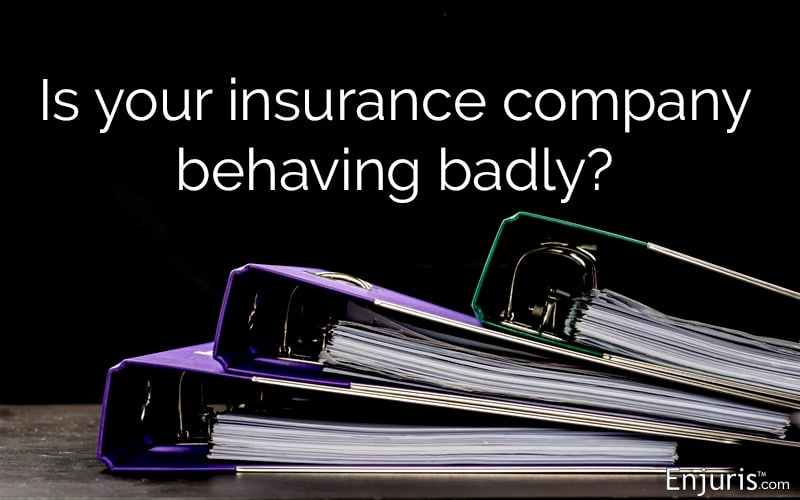Bad faith car insurance attorney – a crucial topic that delves into the nuances of legal ethics, client representation, and potential repercussions. Let’s explore the intricacies of this issue.
This comprehensive guide will shed light on what constitutes bad faith behavior in car insurance attorneys, how to identify signs of misconduct, the impact of such actions, and steps to address them effectively.
Overview of Bad Faith Car Insurance Attorney

When a car insurance attorney acts in bad faith, it means they are not fulfilling their duties ethically or legally towards their clients. This can involve various actions such as withholding information, providing inadequate representation, or prioritizing their own interests over those of the client.
Car insurance attorneys play a crucial role in representing clients who are dealing with insurance companies that may be acting in bad faith. These attorneys are responsible for ensuring that their clients receive fair treatment and compensation for their claims.
Examples of Bad Faith Actions by Car Insurance Attorneys
- Deliberately misleading clients about the status of their claims
- Failing to communicate important information about the case to the client
- Settling a claim for an amount that is significantly lower than what the client is entitled to
- Engaging in conflicts of interest that prioritize the attorney’s financial gain over the client’s best interests
Signs of Bad Faith Behavior
When dealing with a car insurance attorney, it is crucial to be aware of potential signs of bad faith behavior. These indicators can help clients identify unethical practices and take necessary actions to protect their rights.
Common Red Flags
- Delays in communication or lack of responsiveness to client inquiries.
- Failure to provide updates on the progress of the case or withholding important information.
- Pressuring clients to accept a settlement offer that is not in their best interest.
- Charging excessive fees or expenses without proper explanation or documentation.
Unethical Practices, Bad faith car insurance attorney
- Submitting false or misleading information to the court or insurance company.
- Engaging in conflicts of interest by representing both the client and the insurance company.
- Ignoring or violating the attorney-client privilege by sharing confidential information without consent.
Recognizing Bad Faith Behavior
- Trust your instincts – if something feels off or unethical, it’s essential to address your concerns with the attorney.
- Seek a second opinion from another legal professional to validate the advice or actions of your current attorney.
- Document all interactions and communications with your attorney to have a record in case of disputes or unethical behavior.
Consequences of Bad Faith Actions

When car insurance attorneys engage in bad faith practices, there are serious legal consequences that can arise, impacting both the attorney and their clients.
Legal Consequences for Attorneys
- Loss of License: Attorneys found guilty of bad faith actions may face disciplinary actions from the state bar, including suspension or revocation of their license to practice law.
- Fines and Penalties: Attorneys may be required to pay fines or penalties for their unethical behavior, further damaging their reputation and livelihood.
- Lawsuits: Clients who have suffered harm due to bad faith actions can sue the attorney for damages, leading to costly legal battles and potential settlements.
Impact on Clients
Clients are severely affected when their attorney acts in bad faith, as they may face the following consequences:
- Denial of Coverage: Clients may have their insurance claims unfairly denied or delayed, leaving them without the financial support they need after an accident.
- Financial Loss: Clients may incur additional expenses or losses due to the attorney’s misconduct, forcing them to seek alternative legal representation and potentially jeopardizing their case.
- Lack of Trust: Clients may lose trust in the legal system and struggle to find a reliable attorney in the future, impacting their ability to seek justice and proper compensation.
Real-life Cases
There have been numerous real-life cases where bad faith actions by car insurance attorneys have led to legal repercussions. One notable example is the case of Smith v. Johnson, where the attorney was found guilty of withholding crucial evidence in a personal injury claim, resulting in the client’s case being dismissed and the attorney facing disbarment.
How to Address Bad Faith Car Insurance Attorneys

If you suspect that your car insurance attorney is acting in bad faith, it is crucial to take appropriate steps to address this issue promptly. Failing to address bad faith behavior can result in significant consequences for your case and legal representation. Here are the steps clients can take if they suspect their car insurance attorney is acting in bad faith:
Process of Filing a Complaint Against an Attorney for Bad Faith Behavior
- Document the instances of bad faith behavior: Keep detailed records of any communication, actions, or decisions made by your attorney that you believe constitute bad faith.
- Consult with another attorney: Seek advice from a different legal professional to get a second opinion on whether the behavior of your current attorney qualifies as bad faith.
- Contact the state bar association: File a complaint with the state bar association or relevant regulatory body that oversees attorney conduct. Provide all documented evidence to support your claim.
- Cooperate with the investigation: If the state bar association decides to investigate your complaint, make sure to cooperate fully and provide any additional information or evidence requested.
- Consider legal action: Depending on the outcome of the investigation, you may have grounds to pursue legal action against your attorney for acting in bad faith.
Resources or Organizations for Guidance and Support
- American Bar Association (ABA): The ABA offers resources and guidance on legal ethics and professional responsibility, which includes information on dealing with bad faith attorneys.
- Legal Aid Organizations: Local legal aid organizations can provide support and assistance to individuals facing issues with their attorneys, including those acting in bad faith.
- Consumer Protection Agencies: Contact consumer protection agencies in your state or region to seek advice on addressing bad faith behavior by your car insurance attorney.
- Legal Malpractice Attorneys: Consider consulting with legal malpractice attorneys who specialize in cases involving attorney misconduct or negligence.
Closure
As we conclude our exploration of bad faith car insurance attorneys, it becomes evident that vigilance, awareness, and prompt action are key in navigating potential legal pitfalls. By understanding the signs, consequences, and solutions, clients can protect their rights and seek justice in cases of attorney misconduct.
Key Questions Answered
What are common red flags of bad faith behavior in car insurance attorneys?
Common red flags include lack of transparency, conflicts of interest, ignoring client communications, and pressuring clients into settlements.
How can clients address suspicions of bad faith behavior by their car insurance attorney?
Clients should document all interactions, seek a second opinion, consider filing a complaint with the state bar association, and consult with legal experts.
What legal consequences can car insurance attorneys face for engaging in bad faith practices?
Legal consequences may include license suspension or revocation, malpractice lawsuits, and reputational damage within the legal community.
Are there organizations that provide support for dealing with bad faith car insurance attorneys?
Yes, organizations like legal aid societies, bar associations, and advocacy groups offer guidance, resources, and assistance to clients facing attorney misconduct.
